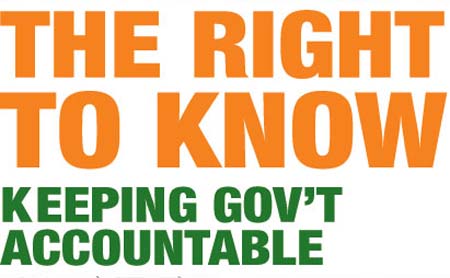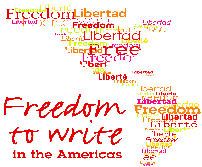 This week, Article 19 offices and staff are participating in events in eight countries including Bangladesh, Kenya and Mexico to celebrate Right to Know Day 2010 and to promote the right to information around the world (RTI).
This week, Article 19 offices and staff are participating in events in eight countries including Bangladesh, Kenya and Mexico to celebrate Right to Know Day 2010 and to promote the right to information around the world (RTI).
According to Article 19, several countries have adopted new laws and others have adopted amendments to improve laws and constitutions. Over 90 countries representing nearly five billion people have now adopted laws or national regulations on RTI.
However, over half the countries of the world have not yet adopted RTI laws and many that have done so have failed to implement them adequately. There have also been efforts in several countries to weaken laws.
Activities to Mark Right to Know Day 2010
Article 19 offices and staff are engaged in a series of activities this week to promote RTI:
– London/Mexico: Article 19 launched its Global RTI Index tool methodology. The tool is based on a pilot developed by Article 19 Mexico and FUNDAR to rank Mexico state laws on RTI, which has resulted in substantial advancements in state laws. The methodology has now been revised to allow the tool to analyse and rank RTI legislation globally. Over the next year, it will be finalised and published.
– Mexico: Article 19 will be participating in events across Mexico including in Monterrey on Access to Information as a safety tool for journalists in Tecnologico de Monterrey; the Right to Information, Challenges of the transparency and the National Security Agenda event organised by México Infórmate, the National Security Archive and Citizens in the Media (Ciudadanos en Medios). Article 19 will also be in the second Feria de la Transparencia (Transparency Fair), including a whole day of activities where public authorities and civil society organisations have their own stands and disclose relevant information of their main functions and other relevant information. Activities include concerts, interactive communications and others, in order to promote public participation.
event organised by México Infórmate, the National Security Archive and Citizens in the Media (Ciudadanos en Medios). Article 19 will also be in the second Feria de la Transparencia (Transparency Fair), including a whole day of activities where public authorities and civil society organisations have their own stands and disclose relevant information of their main functions and other relevant information. Activities include concerts, interactive communications and others, in order to promote public participation.
– Kazakhstan: Article 19 is releasing its legal analysis of the draft RTI bill. Last week, Article 19 presented its comments to a committee of the Parliament of Kazakhstan.
– Bangladesh: Article 19 has launched a week long programme of activities in collaboration with the Information Commission including training of public officials.
– Kenya: Article 19 is participating in a public forum on devolved funds and taking part in a meeting on public information as a tool for good governance.
– Brazil: Article 19, Transparência Brasil and Abraji are releasing the summary of responses from Senate candidates on their positions on RTI. The day will also include a seminar involving Article 19 and Transparência Brasil in Fundação Getúlio Vargas, a traditional university in São Paulo.
– El Salvador: Article 19 will be participating in the Central American Forum for Transparency.
– Belgium: Article 19, in cooperation with the Foundation for Media Alternatives (FMA), is organising a two day workshop on RTI in Asia and Europe as part of the 4th Connecting Civil Societies Conference, prior to the 8th Asia-Europe (ASEM 8) Summit next week.
According to Ar ticle 19, the last year has seen much advancement and some setbacks to RTI.
ticle 19, the last year has seen much advancement and some setbacks to RTI.
RTI Advances
– New Laws and Recognition. The number of jurisdictions with RTI laws continued to grow. Over the past year, new laws were adopted in Liberia and Bermuda. Many others have improved their laws. In Australia, the archaic Freedom of Information Act, 1982 was substantially amended and improved. The Organization of American States adopted a model RTI bill for adoption across the Americas and the Caribbean. The adoption of related laws also continued to expand – in Uganda for example, a comprehensive whistleblowing law was adopted.
– Constitutional Rights. Increasingly, countries are including RTI in new constitutions. In the past year, the recently approved Kenyan constitution includes substantial RTI provisions while Article 19 of the Pakistani constitution was amended to include RTI. A decision in the Canadian Supreme Court fell short of fully endorsing RTI as a constitutional right. Now, over 80 countries recognised right to information as a constitutional right.
– New Bills. There are more efforts in countries around the world to consider RTI laws. In total, over 50 countries have proposals to adopt laws pending. Some of the more recent efforts include Argentina, Bhutan, Pakistan, Senegal, Sierre Leone, Spain, Ukraine, and the Malaysian state of Selangor.
– Environmental Information. The right to environmental information was strongly advanced as a global right during the last year. The UN Environmental Programme (UNEP) released new global guidelines for the development of national legislation on access to information, public participation and access to justice in environmental matters in June 2010. World leaders in December agr eed to The Earth Summit 2012, which may lead to a new global treaty on access to environmental information.
eed to The Earth Summit 2012, which may lead to a new global treaty on access to environmental information.
– Open Data. Both the US and the UK governments launched new open data sites to make raw datasets of public information available for the first time. This allows for the public to do its own analysis of policies and expenditures. In the UK, this included detailed spending information.
– World Bank. The World Bank transparency policy released in December 2009 substantially improves the transparency of the Bank. While it is not perfect, there is hope that the policy will set the standard for other international financial institutions.
RTI Setbacks
– Stalled Campaigns. Legislation in Brazil and the Philippines reached the final steps but due to lack of political leadership, both failed at the last hurtle and will have to be reintroduced next year. Efforts in Yemen, Cambodia and Vietnam have also faltered due to lack of political will. There has been no repeal of the infamous Access to Information and Protection of Privacy Act in Zimbabwe following the change in government there.
– National Security. New secrecy legislation proposed in South Africa in the last year would seriously undermine RTI. Anti-terrorism laws are repeatedly used to justify hiding public information and harassing the media.
– Failure to Implement. Many countries have adopted RTI laws over the last few years but have not seriously implemented them. The laws in Angola and Uganda have not been substantially implemented. There are continued efforts by government officials in India to amend the excellent Right to Information Act in order to weaken it.
– Developm ent. The Millennium Development Goals (MDG) summit recognized the importance of transparency and the free flow of information as a central tool in promoting development and achieving the MDGs but failed to substantially include requirements for it in the action plan.
ent. The Millennium Development Goals (MDG) summit recognized the importance of transparency and the free flow of information as a central tool in promoting development and achieving the MDGs but failed to substantially include requirements for it in the action plan.
– Climate Change. Freedom of expression and access to information was severely limited at the failed Copenhagen Climate Change Summit. The resulting Copenhagen Accord failed to include substantial transparency rights essential to ensuing adequate public participation.
Promotion of RTI
In the past year, Article 19 has been actively engaged in promoting RTI in dozens of countries across the world, releasing over 40 documents including legal analyses, reports, and statements.
Article 19 offices have also been providing assessments, trainings and reviews including implementation of RTI in Azerbaijan, access to environmental information in the People´s Republic of China, local administration, heath and education in rural Indonesia, campaigning for RTI in Brazil, Kenya, Senegal and Ukraine, training of officials in Bangladesh, Indonesia, Iraq and Ethiopia, access to health information in East and West Africa, and reviewing access to parliamentary information in East Africa.
Article 19 also held a groundbreaking meeting on RTI and the Millennium Development Goals in August 2010 with over 70 advocates, officials and experts. As a result of the meeting, the London Declaration on Transparency, Free Flow of Information and Development was released.
It also held a meeting of 60 activists, parliamentarians, journalists and lawyers  from across the Middle East to set out an ‘agenda for action’ for RTI in the region in December 2009.
from across the Middle East to set out an ‘agenda for action’ for RTI in the region in December 2009.
Contacts
For more information please contact: David Banisar, Senior Legal Counsel, banisar@article19.org +44 20 7324 2500, Oliver Spencer oliver@Article19.org +44 20 7324 2500.
Article 19 is an independent human rights organisation that works around the world to protect and promote the right to freedom of expression. It takes its name from Article 19 of the Universal Declaration of Human Rights, which guarantees free speech.
HRH London, based on Article 19 press release.


